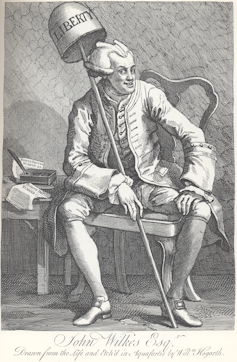Studio of Joshua Reynolds/National Portrait Gallery/Wikipedia
Even simply 40 years in the past, electoral participation on the dimensions we’re witnessing in 2024 would have been unthinkable. More than half of the world’s inhabitants stay in international locations that may maintain (or have already held) an election this yr.
But this nice yr of elections will unfold in opposition to a backdrop of deep unease in regards to the state of democracy. The variety of democracies is declining, belief in democracy is weakening, and voter turnout is trending downwards.
Appetite for political reform is powerful. Citizens have made their discontent recognized by means of abstention, protests, votes for anti-establishment candidates and even violence.
When desirous about handle this disaster, we might do worse than seeking to the 18th-century statesman and political theorist Edmund Burke (1729-1797) who witnessed an identical disaster of illustration not lengthy after coming into the British parliament. I
n 1768, radical MP John Wilkes was excluded from parliament having been earlier outlawed for libelling King George III in a chunk of journalism. Parliament then repeatedly refused to seat him when he received re-election a number of occasions, and ultimately gave the seat to his defeated opponent as a substitute. When troops fired on a crowd of Wilkes’s supporters, killing a number of, riots engulfed London for days.

William Hogarth’s satirical depiction of John Wilkes.
Wikipedia
The purpose parliament refused to confess Wilkes, Burke sensed, had much less to do together with his boorishness, demagoguery or slandering (at the moment he can be branded a populist) and extra to do with the opposition to King George that Wilkes gave voice to. Given that many members of parliament owed their pensions to the king, they had been eager to keep away from offending him by seating certainly one of his enemies, even when this stoked standard anger.
When Wilkes grew to become the focus of a big marketing campaign demanding political reform, MPs condemned the protesters as unruly (a lot as MPs at the moment have tried to limit protests within the title of public order). Popular sympathy with Wilkes even unfold to America, the place colonists’ complaints about their very own lack of illustration had already occasioned violence and would ultimately erupt right into a full-blown warfare of independence.
The individuals can all the time annihilate you
In some methods we’d have anticipated Burke to have sided with the MPs in opposition to a demagogue and his followers. After all, Burke is usually related to the view that representatives must be trustees slightly than delegates – that’s, they need to be free to behave in response to their very own judgement slightly than bend to standard pressures.
Burke famously instructed his personal constituents in Bristol that he wouldn’t all the time obey them, particularly when what they wished was both unjust or silly. When some Bristolians objected to extra toleration for Catholics, for instance, Burke refused to heed them. On this foundation, it will not have been shocking if Burke had defined to the protesters that their grievances had been misplaced and their actions futile.
But this isn’t in any respect how Burke approached the Wilkes disaster. Burke disliked Wilkes however slightly than lecturing his supporters for protesting or defending parliament’s privileges, he warned his parliamentary colleagues in regards to the risks of failing to reply sympathetically to standard discontent.
What apprehensive Burke was that parliamentarians would use public dysfunction as an excuse to numb themselves in opposition to legit protest, and so danger shedding the individuals’s belief. As a consultant establishment, Burke argued, parliament’s job was to check and treatment standard complaints slightly than dismiss them as unreasoned, unenlightened, or extreme. Even violent protesters by no means forfeited their proper to illustration.
As he put it in certainly one of his speeches:
If you lay down a rule that as a result of the persons are absurd, their grievances are to not be addressed, then it’s unimaginable that standard grievances ought to obtain any handle in any respect, as a result of the individuals when they’re injured shall be violent; when they’re violent, they are going to be absurd – and their absurdity will generally be proportioned to the greatness of their grievances, after which the more serious their struggling, the additional they are going to be from their treatment.
This isn’t a Burke that shall be acquainted to many at the moment. But it’s the Burke that politicians the world over must hearken to. This is as a result of politicians greater than ever have a protracted checklist of excuses – from populist insurgencies to disinformation campaigns, from AI-deepfakes to media manipulation – for disregarding anti-establishment criticism as absurd, inauthentic or irrational.
The penalties of that disregarding, nonetheless, might be disastrous. The individuals can all the time do extra than simply vote or protest. As Burke cautioned his fellow MPs, even when it seems just like the individuals can “do nothing else” they “will all the time have the ability to annihilate you”. Burke’s level was that each one authorities rests finally on standard opinion, which means that if individuals resolve in massive numbers to withhold their assent to obey, then one thing nearer to a revolution might end result.
Securing consultant democracy could thus require politicians to indicate extra openness to democratic reforms, extra sympathy to protesters and fewer willingness to make use of populism as a pretext for democratic retrenchment.
![]()
Ross Carroll is the creator of the forthcoming guide Edmund Burke.
